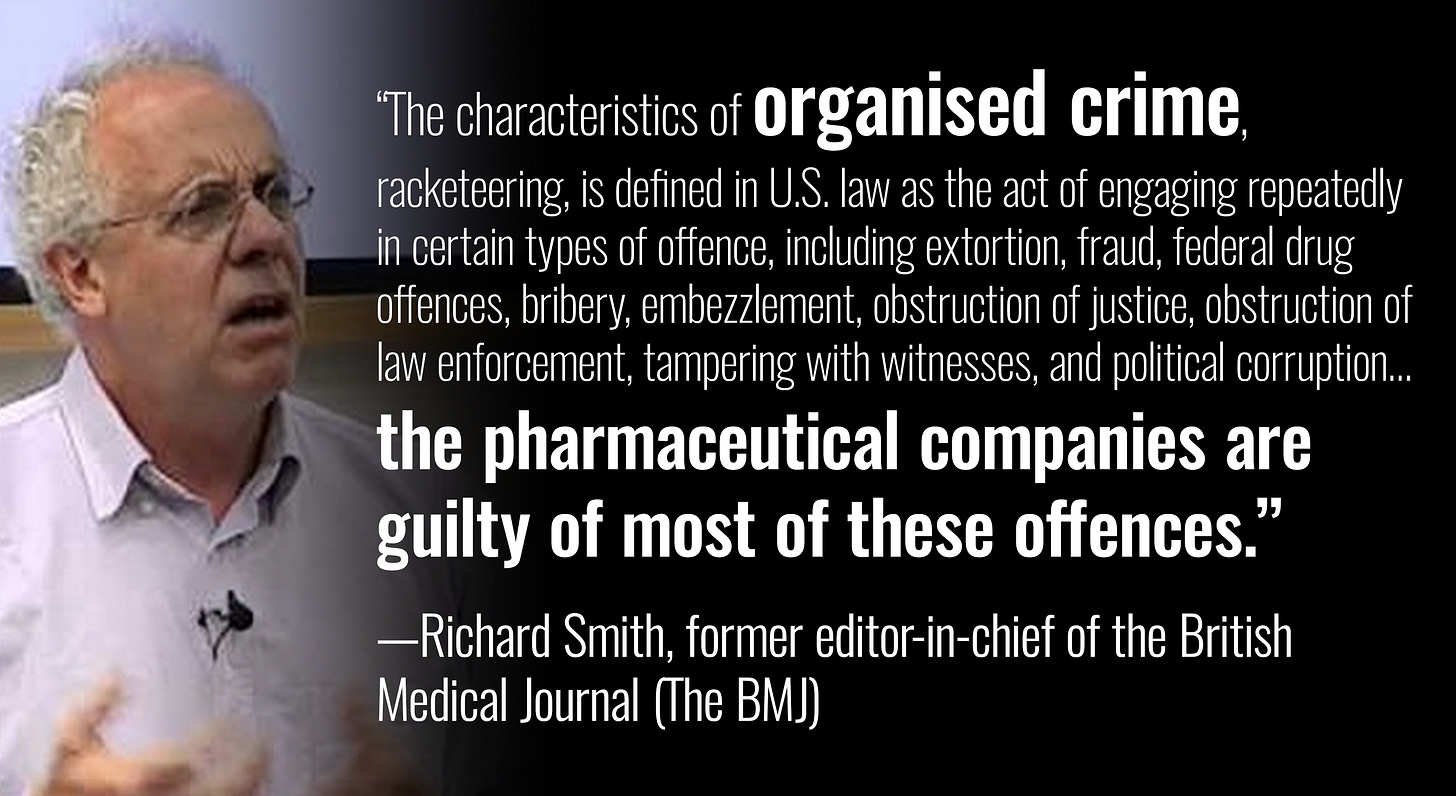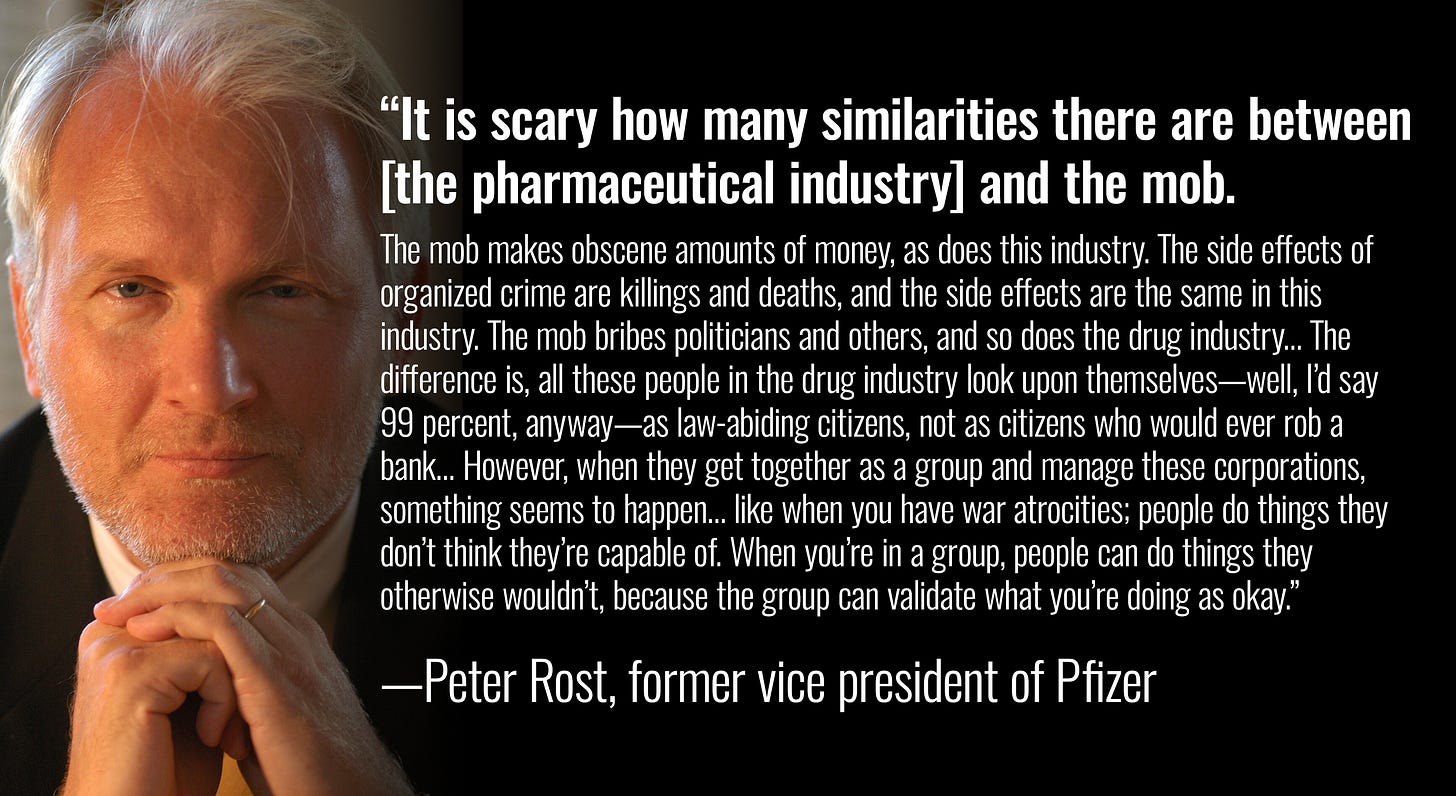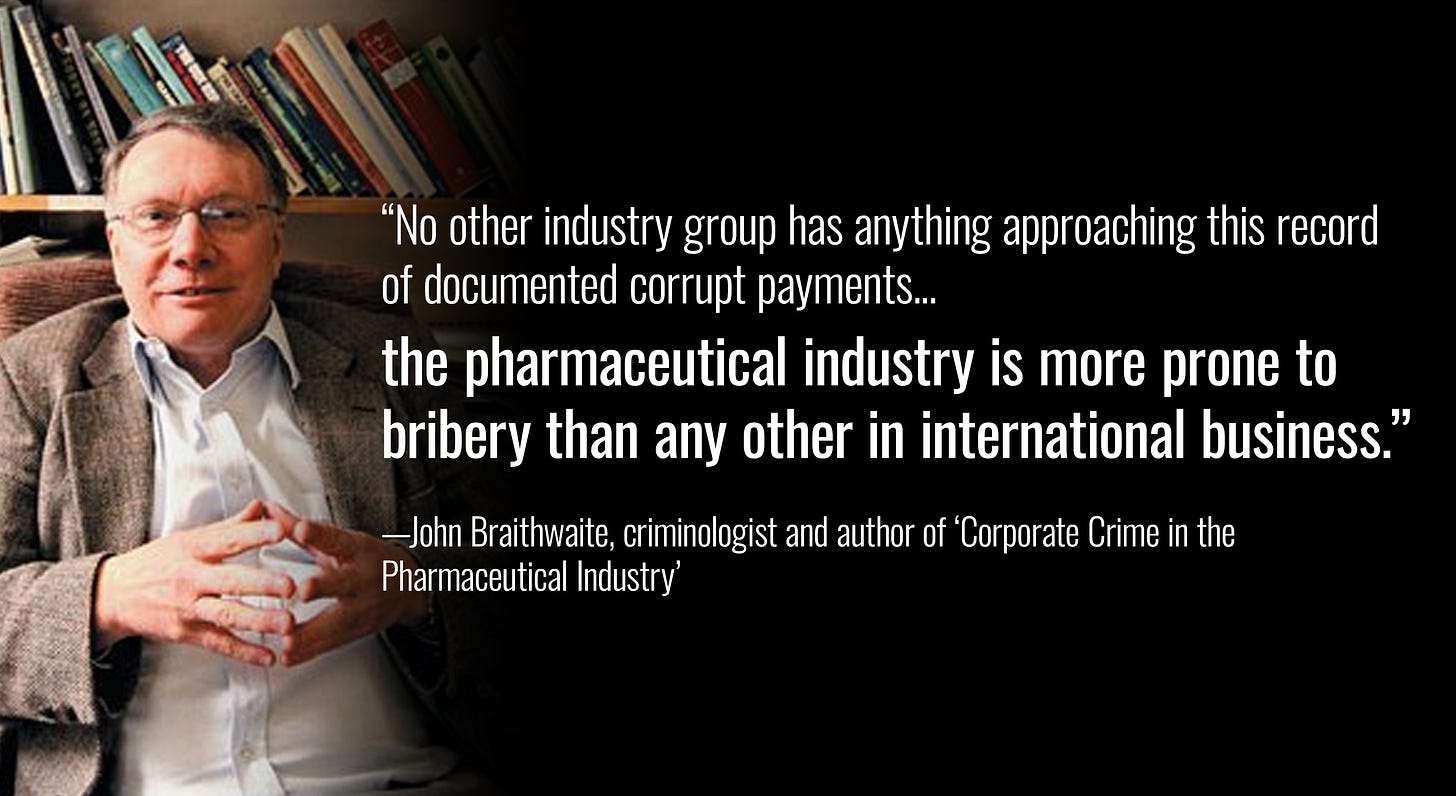Most people already understand the pharmaceutical industry is corrupt. Polls show it’s the most hated and least trusted industry in America.
What’s far less recognized is the mass cognitive dissonance that allows society to continue consuming its products on an enormous scale—despite knowing not to trust it.
The glaring contradiction would be comical if not so deadly: the pharmaceutical industry is regularly ranked as the most distrusted in America, and most people are at least vaguely aware of its criminal record—yet 95% of parents choose to inject their children with its products, and 70% of Americans take at least one prescription drug daily.
It’s akin to trusting a convicted, unrepentant pedophile to babysit your kids.
Not Just a Few Bad Actors
The pharmaceutical industry isn’t just corrupt—it’s structurally, systemically, and unrelentingly criminal. Not low-level crime—but organized crime that puts the mafia to shame, with death tolls rivaling most wars.
It’s an industry whose business model hinges on fraud, bribery, censorship, regulatory capture, and mass harm—repeatedly.
The evidence to support these claims is overwhelming, but for people who prefer to outsource their thinking to perceived authority figures, here are some notable voices likening pharma to organized crime.
Robert F. Kennedy Jr., as U.S. Secretary of Health and Human Services, holds the nation’s highest health policy position, overseeing a $2 trillion department and key agencies like the FDA, CDC, and NIH, which regulate the pharmaceutical industry. He describes the industry as a “criminal cartel” run by “the most corrupt companies in the world.”
Richard Smith, former editor-in-chief of The BMJ, one of the world’s top five most prestigious medical journals, asserts that the pharmaceutical industry meets the U.S. legal criteria for organized crime.
Peter Gøtzsche, renowned researcher and co-founder of Cochrane, a globally authoritative institution in evidence-based medicine, insists that the pharmaceutical industry is not marred by a few bad actors but is entirely corrupt, as detailed in his book Deadly Medicines and Organised Crime: How Big Pharma Has Corrupted Healthcare.

Peter Rost, a former vice president at Pfizer—one of the largest pharmaceutical companies in the world—turned whistleblower, warns that the industry bears frightening similarities to organized crime.
A Sample of Pharma’s Criminality
Most people are familiar with the Purdue Pharma scandal. The company lied about the addictiveness of OxyContin, unleashing an opioid epidemic that’s killed over 700,000 Americans—more than seven times all U.S. military deaths in the Vietnam, Korean, and Iraq wars combined. In 2007, they paid a $634 million fine. In 2020, they declared bankruptcy and agreed to an $8 billion settlement. That’s just one company.
Below is a small sample of some notable crimes from four other major pharmaceutical companies—the same four companies that collectively manufacture every vaccine on the U.S. childhood schedule.
These crimes span both rich and poor nations, often exploiting vulnerable people for experimentation with little to no consequences.
The full rap sheet would fill a library.
GlaxoSmithKline (GSK)
Avandia scandal (1999–2007): Internal data showed the diabetes drug raised heart-attack risk by ~40%, contributing to an estimated 83,000 excess heart attacks. Settled for $3 billion in 2012.
Deadly vaccine trials in Argentina (2007–2008): Pressured vulnerable families into enrolling infants in Synflorix trials without informed consent. At least 14 infants died.
Merck
Vioxx scandal (1999–2004): Hid evidence that its painkiller caused dangerous heart issues—linked to over 100,000 heart attacks and deaths. Settled for $4.85 billion in 2007.
Medicaid fraud & kickbacks (2000s): Failed to pay rebates and incentivized improper prescriptions. Settled for over $650 million.
Sanofi
Depakine birth defects (1980s–present): Failed to warn about the epilepsy drug’s severe birth-defect risk. In France, between 15,000–30,000 cases of deformities and neurological damage.
Dengvaxia vaccine disaster (2016–2018): Their dengue vaccine led to more severe illness and at least 20 deaths among children in the Philippines. Over 800,000 children vaccinated. The program was suspended and lawsuits followed.
Pfizer
Trovan trial deaths (1996): Conducted clandestine pediatric meningitis trials in Kano, Nigeria. Eleven children died, many left blind, paralyzed or brain-damaged. Settled for $75 million in 2009 with Kano state, plus $175,000-per-family payouts.
Bextra kickback scandal (2002–2008): Illegally promoted off-label use of Bextra and 12 other drugs, paid doctors kickbacks, and pushed high-risk dosages. Settled for $2.3 billion in 2009.

A League of Its Own: Pharma’s Unmatched Criminality
Some people might assume the pharmaceutical industry is no worse than any other major industry—that its corruption is just business as usual, or simply a byproduct of its massive size.
That illusion falls apart under scrutiny.
What follows is not about generic corporate misconduct. It’s about a level of fraud, harm, and impunity that is categorically different—in scale, in frequency, and in its direct impact on human life. Pharma isn’t just another bad actor in a corrupt system. It’s in a league of its own.
The Most Fined Industry in U.S. History
The pharmaceutical industry has paid more in criminal and civil penalties than any other sector in U.S. history, with total fines exceeding $60 billion from hundreds of settlements since the early 1990s. Major companies like Pfizer, Merck, Johnson & Johnson, and Teva have each paid billions in penalties for a range of offenses including off-label marketing, price-fixing, kickbacks, and safety violations. Despite these massive penalties, the fines often represent only a tiny fraction of pharma companies’ revenues and profits, effectively making such fines a manageable “cost of doing business” rather than a deterrent. This scale and pattern of enforcement reveal a systemic and ongoing disregard for the law, akin to organized crime’s habitual rule-breaking for profit.
Most Frequent Violator of the False Claims Act (FCA)
Pharmaceutical companies are the leading violators under the False Claims Act, the federal government’s primary legal weapon against fraud on government healthcare programs like Medicare and Medicaid. From 1991 through recent years, pharma has paid more FCA penalties than all other industries combined, with recoveries exceeding $18 billion under the FCA alone. This includes repeated settlements for fraudulent billing, off-label promotion, and kickbacks designed to inflate government healthcare spending illegally. The frequency and magnitude of FCA settlements in pharma far exceed those in other sectors, underscoring pharma’s uniquely criminal role in defrauding taxpayers. Moreover, many companies are repeat offenders, indicating intentional and systemic fraud rather than isolated mistakes.
Systematic Recidivism
Pharmaceutical companies stand out not only for the size of their penalties but also for their extraordinary frequency of repeat offenses. From 1991 to 2021, major pharma firms like Pfizer (15 federal settlements), Novartis (12), GlaxoSmithKline (9), and Johnson & Johnson (6) have faced multiple federal settlements for criminal and civil violations. These repeat offenders account for nearly 88% of the $49.2 billion in total federal penalties paid by the industry during that period, underscoring that a small group of companies repeatedly engage in illegal practices. This pattern of persistent recidivism far exceeds what is seen in other industries, where repeat federal settlements of this magnitude are rare. The same companies have been penalized multiple times for similar misconduct—off-label marketing, kickbacks, price-fixing, and fraudulent billing—demonstrating intentional and systemic wrongdoing rather than isolated incidents or mistakes. Such entrenched repeat violations reveal that fines and settlements have failed as effective deterrents, with companies seemingly treating penalties as a routine cost of business. This uniquely persistent pattern of criminal behavior marks the pharmaceutical industry as egregiously criminal, comparable to organized crime syndicates that repeatedly flout the law for profit.
Deadly Impact
Unlike most other industries, pharmaceutical industry corruption—through illegal marketing, suppression of safety data, and regulatory manipulation—directly causes hundreds of thousands of deaths in scandals like OxyContin and Vioxx. Beyond these, adverse drug reactions kill over 100,000 Americans annually, even when drugs are taken exactly as prescribed. No other major industry causes such widespread, preventable loss of life tied so closely to its corrupt conduct.
Systemic Bribery
Pharmaceutical companies are consistently among the worst offenders prosecuted under the Foreign Corrupt Practices Act (FCPA), paying billions in fines for bribing officials, doctors, and regulators across dozens of countries. Major firms like Pfizer, Johnson & Johnson, GlaxoSmithKline, and Teva have repeatedly engaged in illegal payments to secure drug approvals, push unsafe or off-label drugs, and win government contracts—especially in poorer nations. This widespread, systemic bribery reflects a deeply entrenched culture of corruption that sets pharma apart as one of the most corrupt industries globally.
Least Trusted, Most Hated Industry
Polls repeatedly show the pharmaceutical industry ranks dead last or near the bottom in public trust—worse than oil, banking, or even the federal government. For example, Gallup’s 2019 survey declared pharma the worst industry in America—despite being among the top industries in advertising spend. Imagine how much more hated pharma would be if the media weren’t running PR on its behalf.
Crimes Protected, Not Punished
Pharmaceutical companies operate under legal shields no other industry enjoys, allowing them to evade accountability for serious harms. Unlike other companies—where you can sue for damages—vaccine makers are immune from lawsuits. The 1986 National Childhood Vaccine Injury Act created a special federal compensation program that shields vaccine manufacturers from most liability, while COVID-era emergency use authorizations granted near-total immunity to companies like Pfizer and Moderna, even if their vaccines cause death. These sweeping legal protections are unique to pharma. No other industry receives such blanket immunity for products that can cause lifelong harm or death.
Blind Trust, Deadly Consequences
Some may try to rationalize their use of pharma products by saying, “Sure, pharma is corrupt—but that doesn’t mean I shouldn’t use their drugs.”
That logic might hold for other industries. You can still use oil even if ExxonMobil is corrupt.
But pharmaceutical products are different. They require blind trust.
You can’t verify the trial data. You have no way to measure long-term effects.
When your brakes fail, you notice immediately. But if your child develops seizures months after a vaccine, or your antidepressant causes heart failure five years later, pharma gets to say “It’s just a coincidence.”
The harm is hidden.
The damage is delayed.
The evidence is buried.
And the victims are gaslit.
“But I Trust My Doctor…”
People will give their children dozens of vaccines and take their daily dose of statins and other prescription medication not because they trust the pharmaceutical industry per se, but because they trust their doctor.
But they fail to realize their doctor is a hired gun for the pharmaceutical industry.
Your doctor doesn’t read the raw data. He doesn’t scrutinize the trials, question the journals, or challenge the regulators. He reads guidelines. He follows protocols. He does what he’s told.
Nearly everything your doctor believes—about health, disease, drugs, and vaccines—comes from a literature pipeline funded, ghostwritten, and corrupted by pharma.
The entire medical system is downstream from that literature, and that literature is likewise downstream from a totally corrupt pharmaceutical industry.
Continuing to implicitly trust any of these pharmaceutical products isn’t just willful ignorance—it’s profoundly self-destructive, if not outright suicidal.
Conclusion
Just as it would be utter lunacy to trust a convicted, unrepentant pedophile to babysit your kids, it is equally deranged to trust the products of a criminal pharmaceutical industry with perverse incentives—or the doctors, media, and regulators that serve as its marketing division.
When you buy their drugs, you’re financing organized crime—making you not just a customer, but an accomplice.










All drugs, vaccines and mRNA gene therapies are poisons that the body does not require for health. Tens of millions are brainwashed as to the presumed benefits of taking anything big pharma markets. People love their drugs, their doctors and the HHS more than the love their health. They have abandoned critical thinking and questioning decades ago.
This will not change as the drug mafia makes up almost 20% of the economy. This is why the HHS for all its blubber and chest pounding will not change a thing. With the move to A/i as the master controller, big pharma and the insurance companies will get a gigantic boost in profits as the middle-men of medicine are sent to the gallows.
Big Pharma is run by the same tribe that runs porn, abortion, open borders, communism, banksterism, endless war, and every other ill we suffer from.